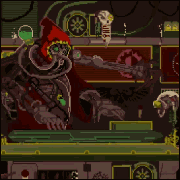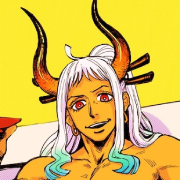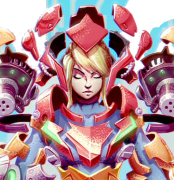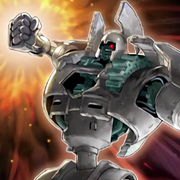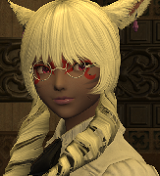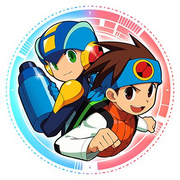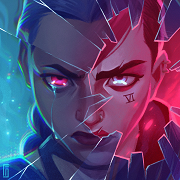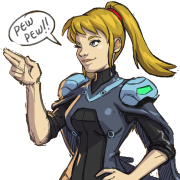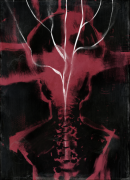|
I'm not sure where the magical climate change is explained, but I'm pretty sure it's not explained when you get to Tailfeather and see that it's lush forest instead of snow. It could do with a line or two at least.
|
|
|
|

|
| # ? Jun 2, 2024 19:48 |
|
I doubt Bahamut knew about recent events in Ishgard from his moon hole, but it is a Calamity-caused corrupted ice aether problem that affects a relatively small area.
|
|
|
|
If you explore western corethas its very apparent that the eternal winter is not natural, given that whole villages and ships are basically frozen in place because of the calamity.
|
|
|
|
Qwertycoatl posted:I'm not sure where the magical climate change is explained, but I'm pretty sure it's not explained when you get to Tailfeather and see that it's lush forest instead of snow. It could do with a line or two at least. I think it's primarily mentioned in incidental NPC dialogue and sidequest stuff, both in ARR (the 40s MSQ and in the patch content) and during HW itself.
|
|
|
|
Qwertycoatl posted:I'm not sure where the magical climate change is explained, but I'm pretty sure it's not explained when you get to Tailfeather and see that it's lush forest instead of snow. It could do with a line or two at least. The two zones are actually a fair distance away. If you zoom back on the map you can see where the zones are in relation to each other.
|
|
|
|
FuturePastNow posted:I doubt Bahamut knew about recent events in Ishgard from his moon hole, but it is a Calamity-caused corrupted ice aether problem that affects a relatively small area. my theory has an answer to this but the LP hasn't gotten to it yet (if it does, given the vagaries of when job quests happen). nidhogg's call to war reached across the entire planet and was psychic in nature, it's entirely possible that bahamut/the trapped dragons in the coils could have heard it once they landed, or even from the moon. the reason i feel like there was an angle involved in bahamut leading into ishgard plot is because there are other scattered fragments of the connection there, such as the bits of dalamud that nidhogg collected to incorporate into the aery. like everything else pre-3.1, it's entirely likely that potential plot threads got dropped and shuffled around because the game wasn't fully steady on its feet.
|
|
|
|
I mean, zones never really lead into one another perfectly. There's always an implication of a long road in between them, except like city gates, but even then they sometimes fudge it a bit. I never questioned going from Coerthans to Dravania for a second, clearly we came down from the mountains and were in a different place. I don't think you can even see the forest from the zone transition on the Coerthas side. It's not Dark Souls, they're meant to be completely different areas.
|
|
|
|
Twice a year I drive from a rain-soaked river valley over (sometimes) snowy mountains into a desert over about three hours. The transition lines can be hilariously sharp, particularly between the mountain forest and the empty desert plains. Tailfeather didn't seem unusual to me.
|
|
|
|
Begemot posted:I mean, zones never really lead into one another perfectly. There's always an implication of a long road in between them, except like city gates, but even then they sometimes fudge it a bit. I never questioned going from Coerthans to Dravania for a second, clearly we came down from the mountains and were in a different place. I don't think you can even see the forest from the zone transition on the Coerthas side. You literally cannot see any part of the sea of clouds from any of the connection points in another zone, so yeah Ishgard and the surrounding area in particular has long journeys between zones that are being glossed over.
|
|
|
|
My problem with Tailfeather is that for some God forsaken reason https://www.youtube.com/watch?v=_DiU4xeWahc pops into my head whenever I ride into town
|
|
|
|
Feldegast42 posted:My problem with Tailfeather is that for some God forsaken reason If I can propose a replacement... https://www.youtube.com/watch?v=qdbrIrFxas0
|
|
|
|
Feldegast42 posted:If you explore western corethas its very apparent that the eternal winter is not natural, given that whole villages and ships are basically frozen in place because of the calamity. Yeah, that zone does a really good job in general, both in its appearance and in its quests, of really hammering in how sudden and how bad the climate apocalypse was there. The massive frozen dragon helps lend to the idea that the war was ongoing when it happened, and basically hosed over not just Ishgard, but also Dravania, forcing a lull in the war. One of the reasons Ishgard is even more hosed then they'd normally be is because large swaths of what used to be bountiful farmland became tundra more or less overnight, which also feeds into Ysayle's storyline of her entire village being made into refugees, only for Ishgard to turn them down, and then everyone died in the cold. It's worth noting also that, far as I know, Saint Shiva didn't have connections to ice until after she became Ysayle's primary focus of worship, at which point the trauma of everyone she knew and loved dying in the cold, alongside Halone's connection to ice, bled into her religious views of Saint Shiva, making her into the primal.
|
|
|
|
ProfessorCirno posted:It's worth noting also that, far as I know, Saint Shiva didn't have connections to ice until after she became Ysayle's primary focus of worship, at which point the trauma of everyone she knew and loved dying in the cold, alongside Halone's connection to ice, bled into her religious views of Saint Shiva, making her into the primal. Oblivion's lyrics basically make this explicit. They start with her having a flashback to dying in the snow, quote:Staring at death, I take a breath, there's nothing left quote:The endless lies, I've cast aside, locked them in ice
|
|
|
|
Chapter 30: Swordsoul Final – Into a Peaceful Life A few new sidequests appeared in Kugane after Tataru told me to wrap things up before the trip home. I expected that they would be reactions to the liberation of Doma. Imagine my surprise when it was all random unrelated stuff! In one quest, a pre-teen merchant's apprentice asks you to hand out fliers because the foreigners refuse them when he offers. Most assume that he's playing a prank or pretending because they don't know children start their job training that young in Hingashi. That's a caste system for you! You can also help deliver some pain relief herbs to a laborer trying to earn enough to open a restaurant while he's still young. The scourge of The Sigma Grindset has come to Hydaelyn. And Ardbert thought an eternity frozen in pure light was hell! A more exciting quest sees you helping out a wounded Sekiseigumi who's bleeding to death under a bridge. Foreign criminals hired an assassin to eliminate him and his partner. You warn the partner, who rounds up backup to deal with the threat while you tend to the first guy's injury. This quest featured a detail that stuck out to me: the wounded man explicitly expects his fellow cops to take the assassin alive. We don't find out one way or the other. Still, it did make me reflect that the only word I have on the Sekiseigumi's penchant for summary execution is Hancock's. Maybe I shouldn't have been so quick to trust a guy whose livelihood is protecting the business of a murdering criminal. The most memorable story involves a merchant in love with an actress trying to connect with her. Usually, I wouldn't want to facilitate parasocial relationships with celebrities and possible stalking, but Kheris decides the guy is harmless and snoops around for him. Most of the acting troupe brushes the request for information off, but a friendly fellow at the bar says that if we want to find the merchant's muse, we should follow our noses to someone in floral perfume. This advice comes with a warning.  I bet I know where this is going. The merchant begs Kheris to covertly sniff all the actresses when they come out of the day's last show, which is gross, but again she elects to go along with it. I choose to believe it's because she's hoping a reality check will burst this guy's bubble, and he'll stop idolizing celebrities. As a Miqo'te, she has an excellent sense of smell, and it's not long before she locates the one person wearing a sweet scent. As I predicted, the 'actress' is a man.  Kheris brings the merchant to meet his diva, and by the actor's reaction, this isn't the first time they've spoken. From their exchange, we can infer that he's been giving the idiot the run-around, shielding a needy heart from disappointment, but the time has come for the truth. The merchant seems distraught at first, leading the actor to assure him that this isn't the first time he's attracted a male admirer because of his ability to portray the woman of every man's dreams. But then...  Awww, that's nice. Still a little stalker-y, but nice. It's a cute little quest and another fun cultural reference to Edo-era Japan, specifically kabuki theater. The original practitioners of kabuki were all women, and one of the reasons it rose to popularity was because of the explicitly bawdy nature of many of its stories and the fact that the actresses often had side gigs as prostitutes. The opportunity to see an entertaining and socially transgressive show and then sleep with one of the beautiful stars made kabuki compelling to all walks of life. Performances quickly became hubs of urban economic activity, with brothels, food service, and shopping outlets opening up alongside every major stage. The shows became a vector for merchants to advertise their wares, as they would contract the most popular stars to sport their fashions or use their goods as props on stage. All the glitz and sleaze of modern Hollywood in the 17th Century! Historically, having the entrancing beauty end up a man is even more on-point. The Tokugawa Bakufu didn't like kabuki because it infringed on their carefully designed social stratification and gave those drat merchants a platform to showcase their wealth. The Samurai and Noble classes pushed for and got a ban on kabuki performances by women in the 1650s. Unfortunately for the attempt at moral policing, the vacuum was soon filled by another feature of the era: adolescent boys who had reached sexual maturity but had not yet undergone the official ritual to enter adulthood in their early 20s. These boys were known as wakashu, beautiful youths, because of their idealized androgyny.  Allowing this 'third gender,' as scholars sometimes call it, to take over kabuki worsened the 'problem.' Social convention held that wakashu were acceptable sexual partners for both men and women, and the upper classes were particularly enamored with them. Having accomplished nothing but to expand kabuki's audience, the government eventually banned wakashu performances as well. By then, it had become an ingrained cultural institution, and the social barriers had eroded irreparably. Adult men taking over the performances did little to slow down any aspect of the business. The style became increasingly legitimized until it was recognized as high art, much like good old Billy Shakespeare in the west. Four hundred years later, in FFXIV, we get a story about a foreigner seeing a beautiful young man in a play, falling in a courtly sort of love with him, and ultimately having no problem after learning his real gender. The story even ends with a big speech from the merchant about how rich and unique Kugane's culture is. Funny old world, isn't it? ~*~*~ Finding that wounded Sekiseigumi prompts me to check in with Makoto. She informs me that Captain Kondo has committed suicide to atone for all the men he's lost to Ugetsu's insurgents. So, that's a thing. Shiden, that friendly squad commander I met last time, has taken charge and assigned Makoto to monitor the docks in case anyone tries to sneak into the city. He's acting as the Tairo's bodyguard and has posted the bulk of the remaining elites to protect the path between the castle and the foreign embassies. It's a sound plan, but Makoto says she'd feel better if Musosai's apprentice was around to provide some extra muscle. Kheris wanders the piers looking for trouble and finds something peculiar: a charm necklace covered in blood near the fishing wharves. When she shows it to Makoto, the woman recognizes it instantly.  Her surprise prompts Kheris to press her on specifics surrounding the suicide, and she admits she didn't actually see the body. There's no question that some plot is afoot. If someone is passing lies about a murder through the ranks, then we have turncoats within the Sekiseigumi! We rush to the Ijin District to warn Shiden, but the guards there inform us that the Tairo has made an impromptu visit to the pleasure houses. He's infamous for using official funds on such indulgences. Makoto is confident that the murderer will use this opening to strike, so we rush to back Shiden up. Unfortunately, when we find him, he's not looking for help.  Shiden proudly admits that he is the traitor. Not only did he arrange the Captain's death, but he was also responsible for the ambush against Makoto's recon mission. As she sobs at the horror of it all, Makoto manages to ask how he could do this. It's not the betrayal of his country she wants an explanation for, but the murder of his closest friends to advance that betrayal. It's a fair question. Kheris has sympathy for this revolutionary cause. She's seen and heard enough of Hingashi to get why someone would want to overthrow the regime, even though she's pledged to stop the collateral damage their efforts are inflicting on the city. Yet Ysayle, even at her most zealous, never contemplated murdering those who trusted her for the cause. Shiden answers her by telling a story. When he was a lowly peasant working the rice fields, his lord took so much of the harvest in taxes that everyone in the region was on the brink of starvation. To save their community, his parents petitioned the nobleman for relief from this tyranny. In response, they were both burned alive in the village square. Jesus! And yet this wasn't enough to radicalize Shiden. Instead, he tried to turn the event into something positive by joining the Sekiseigumi. He believed that Samurai were servants of justice, and he wanted to change the world. Instead, year after year, he was made to hunt down petty criminals and uphold laws laid down by the same people that killed his family. He swore he would help people avoid suffering, but he's nothing but an errand boy to politicians who spend taxes on getting their spears polished.  It's an understandable perspective, and Mokoto isn't naïve enough to dismiss it. However, she does try to appeal to him on the grounds that the solution he's proposing will lead to civil war and, thus, the death and suffering of millions of peasants just like him. Sadly, Shiden is too far gone to care. Ugetsu has radicalized him to the point where he sees that suffering as better than what currently exists. After all, the status quo has already killed his parents. Better for Hingashi to be "reborn in the fires of conflict," no matter how many corpses that change takes. Once again, Kheris' mind can't help but drift to Ysayle. She gave much the same answer in the basement of that farmhouse. Then she died trying to make amends for that belief. We have little choice but to stop him, but this is an anime, so he proposes we take the fight to another venue to avoid involving civilians. At first, the fight goes well. Even after he starts throwing around fiery red x-slashes, he's no match for us.  Unfortunately for our dumb protagonist selves, it isn't long before we learn that agreeing to meet up at a spot he picked for the duel was a big mistake.  Shiden has been covertly recruiting the disaffected among the Sekeiseigumi's ranks for some time, and he arranged the deaths of every person who refused his pitch. That includes the kid killed on the Ruby Sea during the ambush. He knew that Shiden was a turncoat and kept it to himself to protect the man. All the victims did. After his covert purges and the murder of the Captain, Makoto and I are the only things between him and total control of the organization. Either we stop him now, or the police become an arm of the revolution. If that's not proof that Ugetsu's side is wrong, I don't know what is! Fortunately, we do not have to John Cena our way out of these impossible odds. A battle cry announces the arrival of none other than Captain Kongo, along with every loyal Sekiseigumi. He lived bitch!  Shiden is left for Kheris to handle, which she does with relative ease and without killing him. When their commander falls, the traitors flee. Kongo attempts to secure his young friend's surrender, but Shiden runs himself through in an act of sheer defiance. The Captain whispers to the corpse that he hopes they'll meet again in a less tragic life. Back at the base, Kondo explains that the charm we found saved his life, partially catching the blade that was meant to kill him. He fell into the water and was able to stay under until Shiden believed the job was finished. He also takes the time to apologize to Kheris for presuming her a threat just because she was a foreigner and to thank her for preserving peace. That last bit hits a nerve for Makoto, who has taken Shiden's view on things to heart. She asks if we can say we're protecting peace when we're allowing corrupt trash like the Tairo to run rampant over the innocent. After all, isn't the first duty of a Samurai to correct injustice? Are they not shielding the wicked every time they turn a blind eye to the Bakufu's crimes? Kongo says part of him agrees with that sentiment, which surprised me. I guess when Makoto said everyone in the order was a former peasant, that included their leader. However, he also points out that while the Tairo may be a letch who embezzles tax money, he's also the keystone to the government's efforts to keep the feudal lords in check. Many of them dream of using force to usurp control, just as they did in the old days, and Ugetsu wishes to do now. The Tairo has dedicated his life to manipulating the daimyos so that they continue to work within the system rather than resorting to violence to get what they want. We can infer that this "skillful interventions" method of control requires the government to sometimes look the other way when a lord burns unruly peasants alive, and we have to accept that as the lesser evil.  It's not a very satisfying answer. It makes Hingashi seem like a glass house where everyone is throwing rocks, and only the handful of people trying to catch them are keeping things in one piece. If the government is so unstable that civil war is a constant threat, taking the peasant revolutionary's side seems much more reasonable. Maybe Ugetsu doesn't have the same clean hands as Hilda, but Hingashi is in a far more precarious balance than Ishgard ever was. What if the outcome we're struggling against is inevitable? And yet, I couldn't help but dwell on Ysayle. She'd been certain that violence was the only way to see justice done against the evildoers shielding themselves with their power and privilege and that collateral damage was acceptable to get that done. But when she finally crossed that line, those innocent deaths haunted her. It was only when her Heretics were pouring into the city's heart that she realized she wanted the bloodshed to end far more than she wanted it to be redirected to the correct targets. Shiden didn't live to regret the friends he murdered for his quest and never had to see the innocent corpses he dismissed as a necessary sacrifice. What would his actions have ultimately done to him if he'd succeeded? Worse, what would it say about the world he wanted to build if he never felt that regret? This conversation also illustrates something important about this Job's ethos that I didn't fully grasp before. Samurai were born out of trauma rather than conviction. The powers of the Paladin and Dark Knight that I've compared their ideology to were ultimately invented because the original wielders had a mission to fulfill, a system of beliefs to actualize. Samurai created their techniques in the fires of an already existing war. Their only missions were survival and victory, and this context must color our understanding of what they have become. Modern Samurai are memories of the Age of Blood, literal centuries in Hingashi where the only law was the sword, and human life was cheaper than a few grains of rice. If you talk to Makoto in between Job Quests and ask her, "What is a Samurai," she explains that whenever Musosai talked of bringing justice, it was indelibly linked to the idea that doing this preserves the peace. In some ways, it's the opposite of what Kheris was taught as a Free Paladin. To Paladins, the trappings of a peaceful society are tools to ensure justice as a goal unto itself. To a Samurai, the removal of injustice matters specifically because it's a threat to peace. Samurai don't fight to preserve the status quo in Hingashi for its own sake or because they believe the world they live in can't be improved. On the contrary, we've seen those fighting for the Bakufu acknowledge its failings and desire reform. They fight for it because they understand what the Age of Blood truly was and firmly believe it is not an acceptable alternative to any problem. Ensuring that the circumstances of their creation never come about again is their first duty. Of course, Ugetsu and his followers have become disillusioned with that notion, and it's about time we heard his opinion. A few of Shiden's men were captured during the fight and gave up the location of their headquarters, an abandoned ruin in Yanxia. Kongo knows that Ugetsu's back is against the wall after losing his second, and he'll either strike first or go into siege mode. Only Makoto, Kheris, and himself have the skill with a blade to face the man directly, so he sends us both to Doma and remains behind to protect Kugane in case he slips through our fingers.  …Yeah, we probably should have seen that coming. We return just in time to see a good old-fashioned Kurosawa one-swing duel. You'll never guess who wins.  Ugetsu has the floor to explain his motivations, and he's quick to hit his enemies in some soft spots. The first words out of his mouth reveal that Makoto's real name is Kagetsu and that she is his sister! As he'll shortly explain, he said this because he knew the moment her friends heard that their First Squad Commander is blood kin to a traitor, their trust in her would vanish. For that same reason, he reveals that Kheris was "the coward Musosai's," apprentice. Turning the Sekiseigumi against us is helpful to his goal of defeating us, but it's even more valuable as proof that his mission is righteous.  It's a classic argument in favor of revolution: the peace we enjoy now is meaningless. If murder, theft, and the domination of the oppressed are the products of the rule of law, what use is the rule of law? The society we're trying to protect says that Makoto is a traitor because she's related to a traitor, and Kheris is a coward because a coward trained her. It's self-evidently absurd, so wouldn't it be better to destroy that society and replace it with something better? In a neat rhetorical trick, he even frames his murder of Captain Kongo as an act of liberation. The Sekiseigumi were chained by the Captain's beliefs, crushed under the boot of the order's hierarchy and their oaths. Now they're free to make their own decision, fight him or join them as they see fit. Isn't it better this way? Makoto attempts to push back against her brother's ideals, reminding him of Musosai's teachings.  Sadly, Ugetsu isn't moved in the slightest.  Hmm… at first, he sounded like he was pushing anarchism, but something about that line is very famili-  YOU ALL THOUGHT THE REVENGEANCE CHAPTER TITLES WERE JUST A GIMMICK, DIDN'T YOU?! Senator Armstrong's famous monologue is explicit about creating a might-makes-right society that is "ruled by strength, not committee," and where people have "the ability to fight their own wars." Ugetsu is more subtle and avoids saying anything too definite about what Hingashi will look like on the far side of his revolution. But there are clues that he is thinking in a similar direction. He claims the current ruling class's sin is not oppression or cruelty but being 'soft and decadent,' a classic authoritarian rhetorical device. He proclaims that Hingashi has been at peace too long and talks openly about how spilled blood nourishes the nation, hinting that frequent or perpetual bloodshed would be a feature in his ideal world. Also, like Armstrong, we can partially ascribe Ugetsu's philosophical leanings to a privileged upbringing. Once he departs, Makoto reveals that they are not peasants but were born into a hereditary Samurai clan in Hingashi's capital city. Ugetsu was a genius swordsman from a very young age (I'm not one of those beltway pansies!), which is why Musosai agreed to train him. But the kind-hearted brother she'd known was gone when he returned from that pilgrimage. He ranted endlessly about the Bakufu and the daimyo lords. Perhaps, in the beginning, the injustice of their deeds upset him, but Makoto soon realized that more than anger, Ugetsu was being eaten up by despair. The journey had erased all his ideals and left him with faith in nothing but his sword arm. The last thing he did as a brother was train Makoto to wield a blade herself. In retrospect, it was clear to her that he intended for her to be ready to survive if he succeeded and Hingashi was consumed by war. When Ugetsu killed those government officials, he did it with full knowledge that the blame for his deeds would fall on his family as well as himself. Thanks to his training, Makoto escaped the government's retaliation. The rest of their family wasn't so fortunate. Now he's possibly destroyed her second family. As our foe predicted, the revelations about Kheris and Makoto being linked to known pariahs have shattered the Sekiseigumi's trust.  Despite this, Makoto feels compelled to face Ugetsu one last time. It's the only way to honor Kongo's wish that she become Captain, to settle accounts with her past, and to protect Hingashi's future. Kheris knows that if Makoto goes alone, she's just going to an execution, and therefore resolves to fight by the woman's side. Regardless of her disgust toward the Hingan government and her sympathies for the rebels' plight, she knows after hearing him speak that Ugetsu needs to be stopped. And she has something special to help get the job done:  100% True Story: I rolled for and won that katana the first time I beat Shiva (Extreme) over a year ago. Ysayle's spirit is with me. Makoto calls the squad together to make a final plea to them, begging them to look past their distrust of her bloodline and face her brother for the sake of peace. They're skeptical, to say the least. On top of the whole 'traitor's blood' issue, Musosai's training produced Ugetsu. Perhaps all his students are on the same side, and this battle is a trap! Makoto points out that Musosai always promoted the protection of peace, and Ugetsu is betraying that belief rather than following it. The others don't buy this argument for a reason that struck me as strange. You see, they only know Musosai for having an undefeated record as a duelist, NOT as a traveling vigilante. Kheris sets the record straight.  …   This situation was confusing to me. Musosai's story hadn't really implied that his activities as a vigilante were a secret or that he and Kogarashi had separate reputations. It's not that there isn't sense behind this idea. At the time, he was traveling with a young boy from a famous family. Obfuscating his true identity to protect his apprentice from retaliation for their activities makes sense. It's odd because it had never come up before or even been hinted at. Musosai told me the name came from his wind aether techniques and didn't mention any other significance. Now it's suddenly a semi-important plot point that nobody knew that he was out putting his ideals into practice, not even the woman who spent the entire story fawning over him. The narrative function of this twist is to give a reason for the Sekiseigumi NPCs to trust Kheris again. She reveals that her mentor was the hero of their childhoods, and she's back in their good graces. That's fine. But a random secret identity tidbit wasn't actually necessary for that job. As we're about to see, the story has a much better tool to change the rest of the squad's minds about us. A familiar face hand-delivers it:   Momozigo's cameo call-out hits the Sekiseigumi hard. One comments that the people of Kugane give him the same looks he gave Makoto every day just because they know he was born a farmer. They had been so quick to default to their prejudices that they'd nearly forgotten they each took up the sword to defy those constraints and make Hingashi a better place.  Having them use this epiphany to get past the idea that Musosai was a coward and a traitor in the warped eyes of their society and remember that he was a hero would have made a lot more sense than that weird secret identity reveal. Either way, they're ready to help us, so it's time to finish this.  Violence breeds violence, but in the end, it had to be this way. The final Duty Quest is a duel with Ugetsu, with no adds and no extra gimmicks. As expected of the climax of a Samurai story! It's also one of the most fun one-on-one quest fights I've had in a long while. He hits hard from the start, forcing you to keep your Third Eye active as much as possible in the early phases. He also uses that same red x-slash that Shiden used, touching back on the claim that the traitor learned the move from Ugetsu. Once his HP drops, he compliments your technique and reveals his hidden powers. First comes new AOE attacks, one that targets your current location like a grenade and another that uses the familiar growing red arc cleaves. When these moves don't work, he gets extra clever and starts dropping Gravity Zones around you before casting the AOEs. If you run in the wrong direction, you'll be slowed and take the hit.  By the time you've got the hang of this, things get really spicy. The cooldown timers on his three moves start to drop as he nears the end of his HP bar, raising the total number of special swings, so you have to dodge more frequently. THEN the attacks grow larger, adding more gravity zones, grenade shots, and layers on the cleave as he gets closer to defeat. By the time the fight ends, there's barely any safe space in the arena! The climax of this escalation is when he unleashes two swings we first saw from Gilgamesh in Battle at the Big Keep: an ice attack that strikes along a checkerboard grid and a cherry blossom-themed arena-wide AOE. By the end, I felt jealous for not having access to these moves. When Ugetsu collapses, Makoto steps forward. When we spoke of her backstory, she mentioned that the true reason she became a Sekiseigumi was to get revenge on her brother. She placed all the blame on him for the death of their parents. With the man who ruined her life on his knees, she gives Kheris a nod. The Warrior of Light sheaths her sword, and Makoto draws her own. Musosai surely would do the same. The only criminal he killed in cold blood was the one who besmirched the honor of the Samurai, and Ugetsu has undoubtedly done that. But I like to think that Kheris believed that Makoto would do better if the choice were left in her hands. She raises her sword above her brother's exposed neck, ready to execute him… then hesitates. He asks why she's hesitating. The camera closes on her face, and the animations we see as she struggles with what to do must be seen to be believed. If you haven't leveled this job, do it, or watch a video of this cutscene TODAY. Screenshots cannot capture everything they packed into her model in these few seconds.  Her hands shake, first subtly and then with dramatic tremors. Her lips twitch around her teeth, her eyebrows furrow, and her eyes widen and narrow, each tick reflecting her emotional turmoil. Her eyes look away from her target for just a split second before she makes them refocus. Her jaw clenches and unclenches as she tries to force herself to act and fails. My jaw literally dropped. This triumph of character animation dwarfed anything else I had seen in this game to date. All they'd learned since they started experimenting with Hildebrand went into this moment, and it shone like a diamond. Ugetsu, blood dripping from his lips, mutters that a Samurai must be decisive and, like Musosai before him, forces the issue.  …  …  Look at her face in these shots. Incredible. With her past finally buried, Makoto leads her men back to the barracks. Only Kheris looks back at the fallen Ugetsu, perhaps in regret for what her fellow student of the blade could have been and the cause he never truly championed. In Kugane, Makoto thanks Kheris for everything and shares that the Bakufu has made her promotion to Captain permanent. She's also pleased to report that the revelation about Musosai and Kogarashi is inspiring the men to redouble their training. The belief that the Sekiseigumi can make positive changes to Hingashi is sparking back to life in a way she hasn't seen in years. She resolves not to waste this energy.    With all the words said, Kheris' Soul Crystal glows. Musosai told her that the path to greater strength was to face another Samurai of equal skill. One last time, the old man is proven right. The technique she inherits from the battle against her sword-brother is called Hissatsu: Guren. Crimson. It fires off that same red x-slash he taught to Shiden. A blow worthy of a revolutionary. Nice touch. Samurai 60-70 was an unusual Job line. It felt thematically strange for a good chunk of its run-time, bordering on troubling. The game has trodden carefully around the subjects of reform and revolution in nation-states. Where the lines get drawn between them and what place violence has in both are questions any story with integrity needs to address if it invokes them, and FFXIV did not shirk from that challenge. These were central issues in ARR and Heavensward, and I felt they were handled well, especially for a game intended to hit a mainstream audience. A big capitalism-loving corporation like Square-Enix producing a story that gives credence to characters like Ysayle and Hilda rather than just making them semi-sympathetic villains was a pleasant surprise. At the same time, one shouldn't ignore that they're taking on feudalism and theocracy because they are acceptable targets or that Ysayle died for causing collateral damage in her revolution. In contrast, Hilda was very explicit that she wouldn't set up guillotines or redistribute any wealth by force because that would be bad. Nobody's seizing any means of production in this game. And yet, the main story was not afraid to say that the have-nots in society have the right to use violence to protect themselves from the tyranny of the upper classes. It supported the idea that force can be a tool for political change when no other options are viable due to oppression. It didn't shy away from acknowledging that sometimes incremental change isn't good enough to solve systemic problems, and more drastic steps can be your only choice to end injustice. The game's no Disco Elysium, but it goes a lot further than I ever expected into topics that most mass entertainment of its era wouldn't touch with a ten-foot pole. In light of all that, seeing Samurai take on these topics by having you join the police and fight a bunch of peasant revolutionaries under the logic that it was too dangerous to overthrow a government that permits its elites to burn people to death felt pretty bad. Is the story salvaged by the end? I, personally, think yes. When Ugetsu finally gets his say, and we are able to figure out that he is a charismatic regressive who is co-opting progressive energy for horrific ends, that's a good twist. The idea that the Sekiseigumi are themselves peasants and that their existence is predicated on breaking down the barriers in their society and making it a better place helps make their opposition to Ugetsu's movement before that twist more comprehensible. The arc of their organization becoming disillusioned with its place as a police force and the warrior of light being instrumental in reviving their founding belief that their country is worth saving is nice. Makoto is a bit generic, but she's likable and serves her role as the Troubled Idealist guiding you through the conflict well. It's a story that is certainly open to critique (the old joke about the liberal idea of progress being more female prison guards comes to mind), but in the end, I think it landed. If there were one thing I would add to make the story work better, aside from making Ugetsu's true nature a bit less subtextual, it would be a greater focus on the Age of Blood and why it was so horrible. Civil War being self-evidently bad is one thing. Finding a way to show us just how much suffering Hingashi's common folk suffered when warlords struggled for dominance is another. It would have done much to legitimize Makoto and Musosai's position and draw a firm distinction between the war Ugetsu wants and the one we're fighting against the Empire. On the bright side, it DID give me the armor from the opening cinematic. And the hat has little kitty ears!  One final thought: I said back when SAM 60-70 started that I had a theory about why the story was pushing back so hard on violence being the way to fix Hingashi. I think the idea behind this story was to be the critique of Samurai Fiction as a genre that SAM 50-60 was not. I've mentioned before that the Warring States period, the real-life basis for the Age of Blood, is considered the Samurai's Golden Age. It's an era that has been endlessly romanticized and sanitized; its major figures have become stock characters and archetypes, and its narratives fixate upon politics and strategy, honor and glory, love and hatred. Stories set during or after this time seldom reckon with the cost to Japan from a century of war. Many Samurai stories are critical of the Samurai as an institution. They highlight the hypocrisies that inevitably arise between following bushido tenants and serving powerful individuals. They critique Japan's society, past and present, and the ills that help produce those hypocrisies. But, at the end of the day, most Samurai stories involve those problems getting resolved at the edge of a sword. Like the Cowboy in North America with his six-shooter, the Samurai is expected to save the town with violence because no other path is possible in his corrupt society. Zatoichi doesn't deal with a corrupt magistrate by alerting his superiors and testifying in court; he kills the guy. In my eyes, a big part of SAM 60-70 is about taking a shot at how Samurai stories romanticize the Warring State period and taking the law into one's own hands. Corruption and exploitation are bad, but anyone who thinks that your nation being on fire for generations is preferable because then you can stab the baddies is a fool. So long as even a chance for progress exists, we should hold onto that. We live in a society... and that's a nice place to live. Next time, Kheris wraps up the last of her business on this continent. See you then!
|
|
|
|
Sanguinia posted:Kheris brings the merchant to meet his diva, and by the actor's reaction, this isn't the first time they've spoken. From their exchange, we can infer that he's been giving the idiot the run-around, shielding a needy heart from disappointment, but the time has come for the truth. The merchant seems distraught at first, leading the actor to assure him that this isn't the first time he's attracted a male admirer because of his ability to portray the woman of every man's dreams. But then... This is one of the side quests l always remember. I'm not really sure why, but it just stands out in my mind whenever I think of the optional quests. Also, I don't remember if Ugetsu is supposed to be using Terminus Est, because that is very much a Garlean technique. Then again, Garleans just hang out in Hingashi, so maybe he aped one of their moves? And in hindsight, you're not wrong: Ugetsu basically does go full on Armstrong and shoot his theoretically reasonable critique of Hingashi in the foot with "Let's have a big old mess of blood and death and then things will get better. Somehow. I am very intelligent." Blueberry Pancakes fucked around with this message at 05:17 on Dec 21, 2022 |
|
|
|
My main conclusion with the samurai 70 quests is we could do with a Hingashi expansion. It's an interesting place with some complex political dynamics, but we never really make an impact. its a setting for a lot of sidequests, but well, they're all to the side. also its drawing from an interesting and aesthetically fascinating period of japanese history. We don't really see it get Fantastic much, but theres a lot you can do with that.
|
|
|
|
Blueberry Pancakes posted:
I had also thought that it might be the Garlean move, even wondering if it signified that they were secretly sponsoring this rebellion like they did in Ala Mhigo, but Shiden and Ugetsu's red X attack is actually called Mijin-giri, which translates roughly to Atom Cutter. But when I looked closely I noticed that Hissatsu: Guren shoots two red Xs, which I don't think is a coincidence.
|
|
|
|
By the time a class reaches 70 , most of them have the full backbone of their rotations. In the case of SAM, the important bit is Hagakure, the kinda useless seeming Sen->Kenki button you get at 68 alongside a "Give me Kenki" button. The core of a SAM rotation is reapplying Higenbana precisely every minute the moment the previous application falls off and wasting as few Sen as possible to do that, and Hagakure is important for getting things into alignment.
|
|
|
|
One small bit of extra characterization of Kugane, and especially how Eorzeans fit into it, is given by the crafting and gathering leve descriptions--you might want to check them out if you haven't already. I guess you won't be able to see them all in game until you have all the crafters and gatherers to level 70, but I don't think it's an issue to look them up out of game--the lore for leves is that they're basically posted publically, after all.
|
|
|
|
So, indeed Usetsu may have a solid foundation (the current government sucks) but his actual goal is something Musosai in particular would find reprehensible (bring back the Age of Blood). Samurai is young, relatively speaking, Musosai fought in the Age of Blood as a young man. For the older generation that time is in living memory of Hingashi, and it is a nightmare to many, a terror to never be allowed to repeat. Which brings me to an interesting observation of job stones. The Samurai one looks modern and almost like a piece of material cut and forged in fire and steel. Which given their origin (at least the modern style of Samurai) is very appropriate. Roluth posted:By the time a class reaches 70 , most of them have the full backbone of their rotations. In the case of SAM, the important bit is Hagakure, the kinda useless seeming Sen->Kenki button you get at 68 alongside a "Give me Kenki" button. The core of a SAM rotation is reapplying Higenbana precisely every minute the moment the previous application falls off and wasting as few Sen as possible to do that, and Hagakure is important for getting things into alignment. Whilst this is true, as someone playing end game Samurai, you can also do what is known as spreadsheet/freeform (non-derogatory) Samurai. Where instead of following a rigid rotation involving Hagakure at specific times and looped weaponskill combos, you only press Hagakure if you need to and instead get the same result through pure weaponskill combo choice and use of Meikyo. Depending on fight, this is an extremely valuable skill because it's able to better react to changing circumstances if you're good at it. The spreadsheet name comes from basically sitting down with a fight timeline and mapping every GCD out in advance in a spreadsheet, which is also a thing for Paladin at max level.
|
|
|
|
Lord_Magmar posted:Whilst this is true, as someone playing end game Samurai, you can also do what is known as spreadsheet/freeform (non-derogatory) Samurai. Where instead of following a rigid rotation involving Hagakure at specific times and looped weaponskill combos, you only press Hagakure if you need to and instead get the same result through pure weaponskill combo choice and use of Meikyo. Huh. I only really play SAM as a sub, so I never really delved into that side of the class. I guess the extra charges that Meyiko and the as-yet-to-be-seen 76 button were given in EW levels made the class loose enough to be that flexible?
|
|
|
|
I've always wondered if part of the reason SAM 60-70 can feel a little ideologically strange to a Western audience is that the Warring States period has a greater presence in Japanese culture and education. So a Japanese writer and audience would better understand that Ugetsu's plan would be a total disaster, as opposed to an American where one of the foundations of our history is the righteous overthrow of a corrupt monarchy and we don't really have a historical equivalent to the Sengoku Jidai.
|
|
|
|
Roluth posted:Huh. I only really play SAM as a sub, so I never really delved into that side of the class. I guess the extra charges that Meyiko and the as-yet-to-be-seen 76 button were given in EW levels made the class loose enough to be that flexible? The 76 button you still want to use on cooldown as part of your minute burst points, but the double Meikyo charge and removal of Kaiten very much opened it up. Even if I'd like Kaiten back you could still do it then. It's also admittedly a high skillspeed thing, at low skillspeed you can't do it nearly as cleanly because you don't have the free GCDs to mix and match between whilst keeping the minute/two minute burst phases right. It's not something most people should do, but I can't stand the GCD in FFXIV at low skillspeed because I'm used to BM Hunter in WoW, and so I tend to go for high skillspeed and thus, freeform Samurai it is (which also avoids the problem where the loop based rotations provided need specific GCD timing to do properly). Lord_Magmar fucked around with this message at 06:36 on Dec 21, 2022 |
|
|
|
1stGear posted:I've always wondered if part of the reason SAM 60-70 can feel a little ideologically strange to a Western audience is that the Warring States period has a greater presence in Japanese culture and education. So a Japanese writer and audience would better understand that Ugetsu's plan would be a total disaster, as opposed to an American where one of the foundations of our history is the righteous overthrow of a corrupt monarchy and we don't really have a historical equivalent to the Sengoku Jidai. America has certainly worked hard to paint over the day-to-day horror of our own Civil War, and it was only about 5 years long.
|
|
|
|
Also now that I think about it, the origin of Samurai being this nightmare war of blood where brother killed brother and nobody could be trusted works well with the fact that Samurai has no abilities it can use on allies to help them, the only other job with that situation of course being Black Mage. I do miss Merciful Eyes though, it was nice to have a self heal for parrying correctly, even if the correct option was always to use the associated damage oGCD instead.
|
|
|
|
Sanguinia posted:America has certainly worked hard to paint over the day-to-day horror of our own Civil War, and it was only about 5 years long. I feel like the mainstream narrative about the ACW is that it was regrettable but necessary to end slavery whereas (as far as I'm aware) there are no positive views of the Warring States period. Like, if there was a storyline in FF14 about stopping someone from violently overthrowing a slave state, I don't think there'd be many people willing to give that story the benefit of the doubt, as opposed to stopping Ugetsu which (deservedly) is given more consideration.
|
|
|
|
1stGear posted:I feel like the mainstream narrative about the ACW is that it was regrettable but necessary to end slavery whereas (as far as I'm aware) there are no positive views of the Warring States period. Like, if there was a storyline in FF14 about stopping someone from violently overthrowing a slave state, I don't think there'd be many people willing to give that story the benefit of the doubt, as opposed to stopping Ugetsu which (deservedly) is given more consideration. The positive views of the Sengoku Jidai, which I off-handedly mentioned in the chapter, are that it was insanely cool and full of badasses doing cool things. Its romanticized as an era of larger than life heroes, and more importantly as the Golden Age of Samurai who served their mighty lords and advanced their goals at the tip of the sword with no need for the moral complexity of the eras that came afterward. The bulk of Samurai fiction is set AFTER the Warring States, and one of the more consistent themes of those stories is how the Samurai struggle to find a place in the post-Sengoku eras. They are sympathetic relics who's power to kill and sense of right and wrong are valuable because the world past the war is always full of corruption. There is implicit longing for the time of warring states because it was simpler and Samurai were more free to act as they see fit. This isn't universal of course, and in a lot of cases its not even intentional. Western stories often have similar subtext, sometimes unintentional and sometimes very explicit, longing for the Antebellum period or even the actual Civil War itself. I've read some great essays that describe Cowboys movies as a post-apocalyptic genre, and Samurai stories can be thought of in a similar way. Hence my thinking that SAM 60-70 is partially about critiqing that thinking by saying "No, actually, The Rule of Law is good and it would probably be better if Yojimbo could have just gotten the corrupt daimyo thrown in prison instead of killing him and then lamenting that if it was still the Sengoku he wouldn't need to remain an outlaw for doing it."
|
|
|
|
Yeah, I'm not much of a fan of this questline. Not that I was expecting much revolution or that to happen in a class quest, but it is disappointing that it basically goes 'yeah it sure sucks that these random peasants got murdered for the temerity of asking for help. Oh well someone has to be the cops I guess'. Like I'm not even asking for Makoto to join Ugetsu or anything, I just don't understand why no one decides to go vigilante like Musosai did. Like I normally despise that quote attributed to Mark Twain about how there are two reigns of terrors but come on if any situation is worth that quote it's this one.
|
|
|
|
Hellioning posted:Yeah, I'm not much of a fan of this questline. Not that I was expecting much revolution or that to happen in a class quest, but it is disappointing that it basically goes 'yeah it sure sucks that these random peasants got murdered for the temerity of asking for help. Oh well someone has to be the cops I guess'. Because Musosai going vigilante didn't actually solve anything and rather directly contributed to Ugetsu being the way he is. Nothing in the questline excuses the atrocities of the nobles, but straight up Ugetsu's plan wouldn't tear them down, they would just hire powerful bodyguards and become even greater tyrants under a new Age of Blood. That's the ultimate argument being made here, it won't be a glorious revolution, it won't be some overthrow of the corruption, it will simply create more corruption. Since the current corruption is in part holdover from the original Age of Blood. It wasn't a member of the government who burnt Shiden's parents, it was a noble lord. They actually make a point in the story that part of the problem is the new government cannot effectively manage to old nobility without making compromise, the nobility who formed the leadership during the Age of Blood. I'd also argue that what we do here is probably one of the biggest changes we do make in a job questline for a large group of people, at least that we've seen so far. We've revitalised the idealism of the Sekeisigumi, reminded them of why they became Samurai in the first place, encouraged them to stop bowing to the whims of corrupt nobles and actually perform their duties to uphold justice for all, not just the few. Lord_Magmar fucked around with this message at 08:54 on Dec 21, 2022 |
|
|
|
To me, this storyline just highlighted how weird it is that Kugane is a place that the WoL visits like a tourist, which is very unusual for them. You just kinda go in and leave, you don't get involved in local problems outside of these job quests, which by their very nature cannot cause any large changes to the state of the world. Even more than in the Steppe, you're just sort of along for the ride. Also, interesting that Fantasy Japan is the one place that hews very closely to real history, where the player is not involved in causing social change.
|
|
|
|
Sanguinia posted:Sengoku cultural history stuff Huh, well, that disproves my theory that a quest about avoiding the Age of Blood at all costs might have hit different in Japan. Neat!
|
|
|
|
Lord_Magmar posted:Because Musosai going vigilante didn't actually solve anything and rather directly contributed to Ugetsu being the way he is. I mean, Musosai's actions as a vigilante did something; they are one of the things that got the Sekiseigumi's idealism back. Without his actions, they would have turned on Makoto and WoL as soon as they were revealed as the sister of a traitor and the student of a coward. They are portrayed as a good thing. I really didn't see anything that specifically said the Age of Blood would be bad because it wouldn't solve anything, it just seemed to me like the story was claiming Age of Blood would create new, bigger problems than a lovely corrupt bafuku and a couple of burnt peasent parents.
|
|
|
|
Hellioning posted:I mean, Musosai's actions as a vigilante did something; they are one of the things that got the Sekiseigumi's idealism back. Without his actions, they would have turned on Makoto and WoL as soon as they were revealed as the sister of a traitor and the student of a coward. They are portrayed as a good thing. The thought that the story would have been well served by someone in the Sekiseigumi's ranks taking up Musosai's mantle and becoming a new Kogarashi is a good one IMO. Makoto doing that as sort of a synthesis of the doubts that Shiden awakened and the conviction that Kongo steeled would have made all the sense in the world. The only problem is that from the storyteller's perspective is that there was nobody left to be the Sekiseigumi's captain and carry the flag of their renewed drive to be a force for justice and reform if she did that because all their other characters are just background people.
|
|
|
|
Hellioning posted:I mean, Musosai's actions as a vigilante did something; they are one of the things that got the Sekiseigumi's idealism back. Without his actions, they would have turned on Makoto and WoL as soon as they were revealed as the sister of a traitor and the student of a coward. They are portrayed as a good thing. Sanguinia posted:The thought that the story would have been well served by someone in the Sekiseigumi's ranks taking up Musosai's mantle and becoming a new Kogarashi is a good one IMO. Makoto doing that as sort of a synthesis of the doubts that Shiden awakened and the conviction that Kongo steeled would have made all the sense in the world. The only problem is that from the storyteller's perspective is that there was nobody left to be the Sekiseigumi's captain and carry the flag of their renewed drive to be a force for justice and reform if she did that because all their other characters are just background people. Also, the person who was directly inspired to become a vigilante, instead of the find justice and improve Hingashi, is Ugetsu. Which is the point I was trying to make. Musosai did inspire a bunch of people towards idealism and to work for a better world, it also inspired the vigilante brutality and mindset of Ugetsu, and Musosai himself wanted better for the world than wandering ronin who slay corrupt individuals but do nothing to change the system for the better, at least that's my perspective. I do agree that a new Kogarashi is a reasonable end point for the story, I just think the story makes an argument that the heroism is what was inspiring, not the vigilante violence/justice. Musosai stood up for people and fought corruption, that doesn't require he be a vigilante to do so, since it's very easy for a vigilante to become a monster in the name of ideals that they've twisted into vengeance (Ugetsu). Maybe it is naive to imagine changing a system from the inside in a position of relative power, but the game has been very consistent in that naivety and not everything is the modern american police force in terms of systemic corruption in law enforcement. Plus, if anything, the Warrior of Light is the inheritor of the Kogarashi title. The wandering champion of the lost and broken, seeker of corruption and destroyer of villains. You could probably have Kongo survive but be too injured to act and then Makoto could become a vigilante but it would be kind of weird I think for her to follow her brother's methods (vigilante justice) with a different motivation is all. Lord_Magmar fucked around with this message at 08:57 on Dec 21, 2022 |
|
|
|
A pupil of Musosai roaming the world as a wandering samurai vigilante, righting wrongs and defeating evils? Isn't that just the WoL?
|
|
|
|
Lord_Magmar posted:Also, the person who was directly inspired to become a vigilante, instead of the find justice and improve Hingashi, is Ugetsu. Which is the point I was trying to make. Musosai did inspire a bunch of people towards idealism and to work for a better world, it also inspired the vigilante brutality and mindset of Ugetsu, and Musosai himself wanted better for the world than wandering ronin who slay corrupt individuals but do nothing to change the system for the better, at least that's my perspective. This is also a good point especially given my own interpretation of the story wanting to be the critique as a counterpoint to Musosai's story being the homage. Definitely a tricky nut to crack, that SAM 60-70. EDIT: Also yeah, just having the SAM 70 achievement award a Kogarashi title Square, you cowards.
|
|
|
|
Sanguinia posted:This is also a good point especially given my own interpretation of the story wanting to be the critique as a counterpoint to Musosai's story being the homage. I also had an interesting thought about how the Samurai story is one of the job quests which could very reasonably be a story/movie about the Warrior of Light, instead of the people they're interacting with. Yes you have the 50-60 being Musosai's last journey, and 60-70 being Makoto vs Ugetsu. But you could argue both are the story of Musosai's last and greatest pupil, the Warrior of Light.
|
|
|
|
Hellioning posted:Yeah, I'm not much of a fan of this questline. Not that I was expecting much revolution or that to happen in a class quest, but it is disappointing that it basically goes 'yeah it sure sucks that these random peasants got murdered for the temerity of asking for help. Oh well someone has to be the cops I guess'. This is largely how I felt as well. It's very easy to go "Ah, but in game, that wouldn't fix anything," and like. Yes. The people who wrote the samurai questline definitely wrote it in such a way that only the bleak and relatively mundane horrors of the status quo can stop a hypothetical reign of blood and terror. That is definitely the storyline they wrote, which is precisely the problem I have with it. It's not like this is the only, or even first, time that FFXIV stumbles hard on encountering systemic inequality or abuse and just kinda shrugs and goes "guess that's just how it is, changing things would be far too violent!" Gridania is filled with incredibly bad questlines that end with "but maybe...it's not that bad that the Moon Cats / Duskwights are mistreated, because changing it would be worse???" And that's what this ended up feeling like to me - a retreat of the worst parts of Gridania, where yeah there's a lot of terrible poo poo going on, But That's Just How It Is! Sure, the guy in charge is exceptionally awful and burns peasants openly for questioning their exploitation, but what if...the other guys are just kinda worse, and we NEED him to hold them in check, because, uh, something something, end of history? In the end the questline's only answer to how effective the radicalization was is to go "AH, but the villain, is a very bad person." Which hey, we were just talking about this being an issue in Yotsuyu's storyline. It's a very common - and very cheap - writing technique when you realize you accidentally made your villain have too many good points: quick, have them suddenly do something unforgiveably evil so we can just ignore all that! Also the actual ending to this storyline is that the sekiseigumi are just as corrupt and awful as they were before, because you've made it a very clear point that yes, you are absolutely here to do the bidding of Mr Peasant Burnings. You've even had a big public execution of the people who were even just nominally going against that. But this time they're fired up about very slow incremental progress, so slow nobody even knows what it'll be, or who'll do it, or what shape it'll take - just that it's DEFINITELY going to happen, because they want it to. Yes, we are tools of oppression, but some day, maybe, we won't be, because. Uh, just because. So I guess it's a very Othardian storyline, is what I'm saying, given what we've already seen in the case of Doma. EDIT: I look forward to the true ending of Stormblood, where we stop the violent rebellion against Garlemald (so many innocents killed to bring nothing but chaos!) and instead peacefully submit and spend the next several hundred years petitioning for a little less oppression, and if they kill any of the workers in the process, well, that's just the price you pay for peace and stability. ProfessorCirno fucked around with this message at 10:28 on Dec 21, 2022 |
|
|
|
ProfessorCirno posted:EDIT: I look forward to the true ending of Stormblood, where we stop the violent rebellion against Garlemald (so many innocents killed to bring nothing but chaos!) and instead peacefully submit and spend the next several hundred years petitioning for a little less oppression, and if they kill any of the workers in the process, well, that's just the price you pay for peace and stability. This is an extremely disengenuous argument, Garlemald is a foreign imperial power actively attempting to invade our ostensible homeland, also we literally didn't start the fight and were kind of actively avoiding doing so. It took Ilberd performing a false flag for us to become fully engaged, and at that point we'd committed so we decided to keep pushing. Furthermore, the voilet rebellion that Ugetsu is performing has always been about slaughter, he makes no attempts to improve the lives of those in need the way that we have been in both Doma and Ala Mihgo whilst fighting against a global superpower. Even furthermore, the corruption of the Sekeisigumi is actually quite weird as has been discussed, they're terminally underfunded by their superiors. It's not just happening because they want it to, these people have committed to doing better and striving for change. But FFXIV as a whole has always taken the stance that violence is not something we seek, but we don't shy away from it when necessary. We've always pushed for peaceful solutions before violent ones, this isn't some new thing, the last violent rebellious civil war in Hingashi, which happened within living memory, led directly to the current corruption. So it isn't a surprise that people look at the idea of a second violent rebellion as unlikely to bring about the solution required, Musosai kind of makes this explicit. His Kogarashi stuff was him going around as a vigilante acting out the same violence of the Age of Blood against those he deemed unjust, and it didn't amount to actual effective change. The game always, always, argues for improvement and equality, it just very rarely concludes "so let us violently kill people to make it happen". The argument isn't the Age of Blood was bad so keep the status quo, it's the Age of Blood was bad so improve the status quo without returning to it. Lord_Magmar fucked around with this message at 11:26 on Dec 21, 2022 |
|
|
|

|
| # ? Jun 2, 2024 19:48 |
|
Lord Ugetsu Did Nothing Wrong
|
|
|







